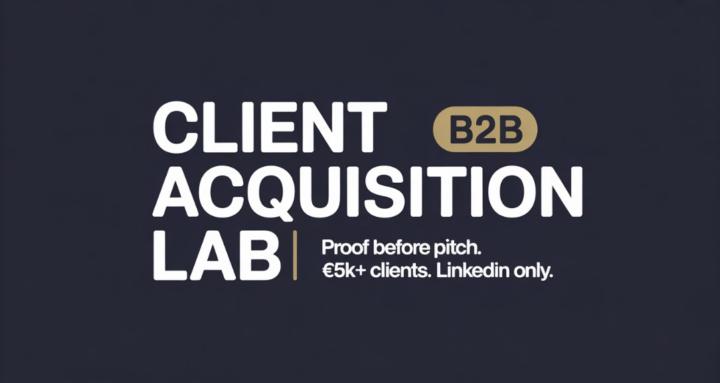
Write something
Conducted a few of my first interviews!
I can now confirm a lot of these conversations felt like therapy for the interview participant! 😂 To Gurt’s point, it’s not a completely representative sample size yet, but the people feeling the most pain are all saying the same things which is giving me some good messaging ideas.
Howto Avoid Data Bias
I have one concern with collection of data for problem validation; how to avoid that the data is biased? For example, the people who agree to talk with you is likely those that have a problem. So if you talked with 5 people and they all say they have a problem, you might still risk that the 95 people that said no to a conversation do not have a problem. Can you still conclude there is a problem? Or when I walk at a conference about security, where people will be who are aware of security and concerned about it, can I then really conclude that there is a problem? I need an initial representative set. Normally you would choose 1000+ by random. Selected without bias. Then interview as many as possible, assuming the ones that won't talk have no problem. Or maybe I'm over analysing here?
Tuesday Community Call: The Validation Framework That Prevents Product Failure
Hey friends! This Tuesday's community call is exclusively for our pro-members and could save you months of wasted effort and thousands of dollars. We're diving deep into validation - the single biggest factor that determines if your product will be a hit or a total flop. The quality of validation you bring to your product journey literally makes all the difference. And I'm not talking about the warm fuzzy feedback you get when someone says "neat idea" - I'm talking about methodical, reality-based validation that ensures you're building something people will actually pay for. Join our live community call this Tuesday to see this framework in action with a real product example. Here's my battle-tested validation framework that's saved teams I've worked with from wasting months building things nobody wants: 1. Problem Validation: Don't Skip This Step! Before you even think about solutions, make absolutely sure you're solving a problem people would throw money at to fix. This is THE most critical step. A beautiful product solving a mild inconvenience? That's what I call a "zombie product" - looks alive but basically dead on arrival. 2. Solution Validation: Build What They Actually Need Once you've confirmed the problem is severe enough, people will actively want to help you improve your solution. But asking the right questions is crucial - I'll share my list of "forbidden questions" that lead to misleading feedback, and show you what to ask instead. 3. Pricing Validation: Timing Is Everything Here's where so many get it wrong. Only validate pricing after your solution has gotten enthusiastic "10 out of 10" responses. Trying to price-test a solution people merely "kind of like" is setting yourself up for failure (or very low prices). 4. GTM/Channel Validation: Finding Your People These validation questions help you discover the most efficient ways to reach more customers like your early adopters. Not absolutely critical, but incredibly valuable for scaling.
Product Validation Update!
Just wanted to share that while I am still working on getting interviews scheduled, I've used the Deep Research agent on ChatGPT to scrape forums to validate some of the points on the PAIN framework Adam shared with me. Since my product is a marketplace and I really only have personal experience on one side of it, this process has been incredibly helpful for helping me prep for interviews. I would recommend the following prompt for anyone looking for some extra information about their problem: "Are people currently discussing the difficulties of X Problem on social media, relevant websites, trade publications, or other groups? Find me 3 recent examples from 2025 if so." Then let the bot scrape the latest posts from Reddit and LinkedIn. Not a replacement for talking to potential customers, but its given me some helpful language to describe the problem I'm solving for!
Want honest feedback? Lie about your product.
Sounds crazy, right? But getting truly honest feedback is HARD. People are often too polite. "Oh, this is great!" "Looks wonderful!" "I like it." Polite nods don't build successful products. They hide the critical insights you NEED. So, what's the secret? Learned this one from the startup-expert Jen Abel: Present your product as unfinished. Even if it's fully built. Even if it's ready to ship tomorrow. Why does this work? It's psychologically difficult to tear down something "finished". People avoid being critical or hurting feelings. Jen Abel said on a podcast: "If you tell them you have a fully baked, ready to go product, they won't give you honest feedback... But when you're vulnerable and when you tell them it's not fully built yet, even if it is... you will get more raw and honest feedback." It makes feedback feel constructive, not critical. Suddenly, they feel comfortable sharing what they really think. You shift from seeking validation to seeking truth. You invite collaboration, not just compliments. One of the small tricks to get the feedback that actually matters.
1-10 of 10
powered by

skool.com/simply-good-business-4176
👉 For experts who want to consistently win €5k+ B2B clients using LinkedIn. Stop competing on price. Start commanding premium.
Suggested communities
Powered by


